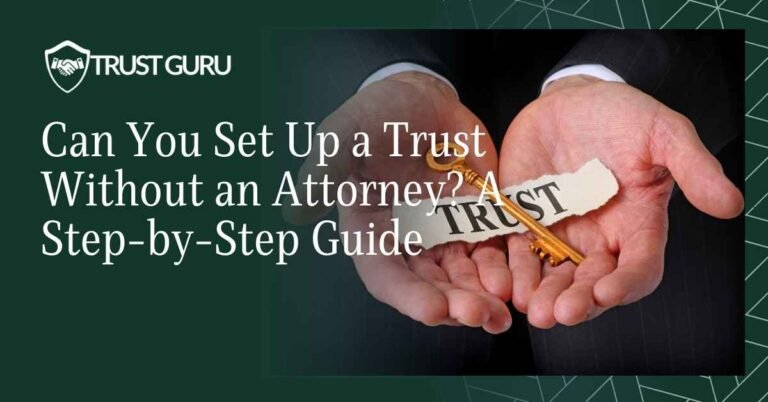Understanding where trusts are recorded in California is crucial for proper estate planning and asset protection.
Many people mistakenly believe that all trusts need to be publicly recorded, leading to confusion, legal errors, and potential risks to their assets.
By clarifying the nuances—such as when recording is necessary, how to handle real estate transfers, and the privacy benefits of trusts—readers can avoid costly mistakes, ensure their property is properly protected, and fulfill legal requirements effectively.
This information is especially important for homeowners, estate planners, and individuals seeking to pass on assets smoothly to beneficiaries.
Article Preview:
- Do Trusts Need to Be Recorded in California?
- Understanding the Privacy of Trusts in California
- When Is Recording Necessary? (Real Estate Transfers)
- How to Properly Record a Trust-Related Deed
- Common Problems and Challenges to Avoid
- The Role of Legal Guidance in Trust Recording
- How Trust Guru Can Help with Your Estate Planning Needs

Do Trusts Need to Be Recorded in California?
One of the most common questions people have is whether they need to record their trust with a government office in California.
The answer depends on the type of trust and the documents involved. Living trusts, which are the most commonly used in estate planning, do not need to be publicly recorded.
Unlike wills, which go through probate and become public documents, living trusts are designed to maintain privacy.
The primary exception occurs when real estate is transferred into the trust. In this case, the deed transfer to the trust must be recorded with the county recorder’s office where the property is located.
Key takeaway:
The trust document itself generally remains private, but specific assets, like real estate, may require public recording through related deeds.
Explore our Living Trust Creation services to understand how trusts can be created and managed effectively.

Understanding the Privacy of Trusts in California
A major benefit of using a trust, particularly a living trust, is maintaining privacy. Unlike wills, which become part of the public record during probate, trusts allow assets to be distributed privately.
This can be particularly valuable for high-net-worth individuals or those who simply wish to avoid public scrutiny.
Why Privacy Matters:
- Protects beneficiaries from unwanted attention or legal challenges: When financial or personal details about an estate become public, it can attract unwanted attention from creditors, scammers, or even distant relatives seeking to make claims. Trusts help shield beneficiaries from these risks.
- Keeps sensitive financial information out of public records: Details about property ownership, investments, and distributions remain confidential. This is particularly important for individuals who prefer to keep their wealth and financial decisions private.
- Reduces the risk of disputes among family members or creditors: Public knowledge of asset distribution often leads to challenges, disputes, and familial tension. By keeping trust details private, beneficiaries are less likely to face contested claims or misunderstandings.
- Preserves family legacy and reputation: Privacy ensures that sensitive issues such as debt, family disagreements, or non-traditional asset allocations do not tarnish the family’s public reputation.
Many people assume that by recording their trust, they are legally protecting their assets.
However, the legal protection comes from proper trust setup and asset titling, not from making the document public.
Learn about Specialized Trust Services that help maintain privacy and secure your assets.

When Is Recording Necessary? (Real Estate Transfers)
If your trust involves real estate property, this is where public recording becomes important.
When transferring real property into the trust, you must record a new deed with the county recorder’s office to reflect the change in ownership.
Steps to Transfer Real Estate to a Trust:
- Create a new deed: This deed should transfer ownership from you (the individual) to the trust. The deed legally shifts the title of the property from your personal name into the trust’s name, ensuring that the trust holds ownership of the asset.
- Include the trust’s legal name: When preparing the new deed, make sure to specify the trust’s exact legal name, including the trustee’s name and the trust date if applicable. For example: “John Doe, Trustee of the Doe Family Trust, dated January 1, 2025.” Any discrepancies between the name on the deed and the trust document could result in recording issues or legal disputes later.
- Sign and notarize the deed: All required parties must sign the deed in the presence of a notary public. The notary will verify identities and ensure that the signatures are legitimate. Proper notarization is critical to ensure the deed is legally valid and acceptable for recording. In this article, it explains California’s requirements for notarizing living trusts, including when notarization is necessary and when it’s not.
- File the deed with the county recorder’s office: Submit the signed and notarized deed to the county recorder’s office where the property is located. This step officially records the change in ownership, making the trust the recognized legal owner of the property. Filing fees may apply, and processing times can vary depending on the county.
Without properly recording the deed, the trust’s ownership of the property may be challenged, which could lead to probate proceedings or other legal complications.
Discover our Real Estate Protection services to safeguard your property during trust transfers.
This guide provides an overview of the deed recording process in California, detailing the importance of recording instruments affecting real property titles.

How to Properly Record a Trust-Related Deed
Recording a deed with the county recorder’s office in California is a straightforward but essential step to ensure real estate is properly transferred into the trust.
However, each step must be carefully executed to prevent delays, rejections, or potential legal complications.
Follow These Key Steps:
- Gather the necessary documents:
- New Deed: This document transfers ownership of the property from the individual to the trust. Ensure it is correctly drafted to reflect the change.
- Proof of Trust: Some counties may require documentation, such as the trust certificate or an affidavit, to verify the trust’s existence and validity.
- Supporting Forms: Depending on the county, you may also need to fill out additional forms, such as Preliminary Change of Ownership forms.
- Ensure accuracy:
- Double-check that the names and details on the deed match the trust exactly, including the trustee’s name, the trust’s legal name, and the trust’s creation date.
- Any mistakes, such as misspelled names or incorrect dates, can lead to rejection by the county recorder and may require re-submission.
- Sign and notarize the deed:
- All required parties must sign the deed in the presence of a notary public. The notary will confirm identities and validate the signatures.
- Notarization ensures that the deed is legally binding and can be accepted by the county for recording.
- Pay any fees:
- Recording a deed usually involves a filing fee, which varies by county. Check with the local county recorder’s office to confirm the exact amount and accepted payment methods.
- Some counties may also impose additional taxes or charges, especially if the property’s ownership changes significantly.
- Submit the deed to the county recorder’s office:
- Once all documents are prepared and notarized, submit them to the county recorder’s office where the property is located.
- Ensure you obtain a receipt or proof of submission, as processing times may vary.
- Confirm the recording:
- After submission, request a certified copy of the recorded deed to keep for your records. This confirms that the property is now officially held by the trust.
- Monitor the status if the recording process takes longer than expected, and follow up with the county if necessary.
By following these steps carefully, you can avoid issues like deed rejection or disputes over property ownership, ensuring the trust is properly recognized as the property owner.
Explore our Asset Titling and Funding services to ensure that your real estate transfers are accurate and legally binding.
This resource outlines the fundamental requirements for recording documents in California, including the necessity of original signatures and proper acknowledgments.

Common Problems and Challenges to Avoid
Here are common issues people face when dealing with trust recording in California:
- Confusion About Recording Requirements: Some people mistakenly try to record the trust itself, which is generally unnecessary. This confusion can lead to wasted time and money, as the core trust document is typically kept private. Instead, only related documents like property deeds may need recording.
- Limited Public Information on Trust Recording: Trust documents are private, making it hard to find accurate information without professional advice. Many individuals struggle to understand when and what needs recording, leading to errors in filing essential documents or missing deadlines.
- Misconceptions About Real Estate and Trusts: Many believe that transferring real estate into a trust automatically involves recording the trust. In reality, it’s the new deed reflecting the property’s transfer to the trust that must be recorded. Misunderstanding this distinction can result in ownership issues that may not surface until the owner passes away.
- Improper Handling of Deeds: Failure to properly record a deed when transferring real estate can lead to ownership disputes or probate complications. Common mistakes include failing to sign or notarize the deed correctly, providing incorrect trust names, or omitting required forms.
- Lack of Legal Guidance: Mistakes often occur when people attempt to handle trust recording on their own without legal advice. Without professional assistance, individuals may submit incomplete paperwork, miss critical steps, or misunderstand county-specific requirements.
- Assuming Recording Ensures Legal Validity: Recording a trust-related document does not substitute for proper trust creation and asset titling. For example, recording a deed does not mean the trust is legally valid unless the trust itself was properly established. This assumption can leave assets vulnerable to disputes or probate.
Take advantage of Asset Protection Trusts to identify and correct potential issues before they become costly.

The Role of Legal Guidance in Trust Recording
Navigating trust recording requirements can be complex, especially when dealing with property transfers.
Working with an experienced estate planning professional or trust service company like Trust Guru can help you avoid errors, streamline the process, and protect your assets effectively.
Benefits of Legal Guidance:
- Avoid common mistakes:
- Properly recording property deeds requires attention to detail. Errors such as misspelled names, incorrect trust information, or missing signatures are common and can result in rejected filings. With legal guidance, you can ensure that your paperwork is accurate and meets the county-specific requirements.
- Stay compliant:
- Each county in California may have slightly different regulations, forms, or filing fees. An experienced professional can help you navigate these regional differences and ensure that you comply with all applicable local and state laws.
- Save time and money:
- Mistakes during the recording process can lead to delays, legal disputes, or the need for costly corrections. By getting it right the first time, you avoid unnecessary expenses and the stress of fixing issues down the road. Professionals can handle the paperwork efficiently, freeing you to focus on other important matters.
Legal guidance is particularly important when handling multiple properties, high-value assets, or complex family dynamics, where even small mistakes could have major financial or legal consequences.
Explore Legal Compliance & Risk Oversight services to ensure that your trust remains legally valid and compliant with California laws.

How Trust Guru Can Help with Your Estate Planning Needs
At Trust Guru, we understand that managing a trust can be overwhelming, especially when it comes to real estate transfers and recording requirements.
Known for our fast response times and quality service, we work closely with clients to ensure their trust and assets are legally protected and properly managed.
Our Services Include:
- Document Review: Reviewing your trust documents to ensure accuracy.
- Real Estate Transfer Assistance: Helping transfer real estate and recording deeds correctly.
- Ongoing Support: Providing support for trust updates and asset management.
By relying on Trust Guru, you can avoid costly mistakes and gain peace of mind knowing that your trust is in expert hands.
View our comprehensive services for complete estate planning solutions tailored to your unique needs.
Conclusion
In summary, understanding where and how trusts are recorded in California is essential for effective estate planning.
While most trusts don’t require public recording, properly recording real estate deeds ensures that property transfers are recognized by law and remain secure within the trust.
Common challenges such as incorrect documentation, lack of legal guidance, and misconceptions about trust recording can lead to serious complications.
With proper guidance, you can streamline the process and protect your assets effectively.
Trust Guru offers the professional expertise you need to navigate this complex process. From creating trusts to recording property deeds and ensuring legal compliance, our team is here to help.













